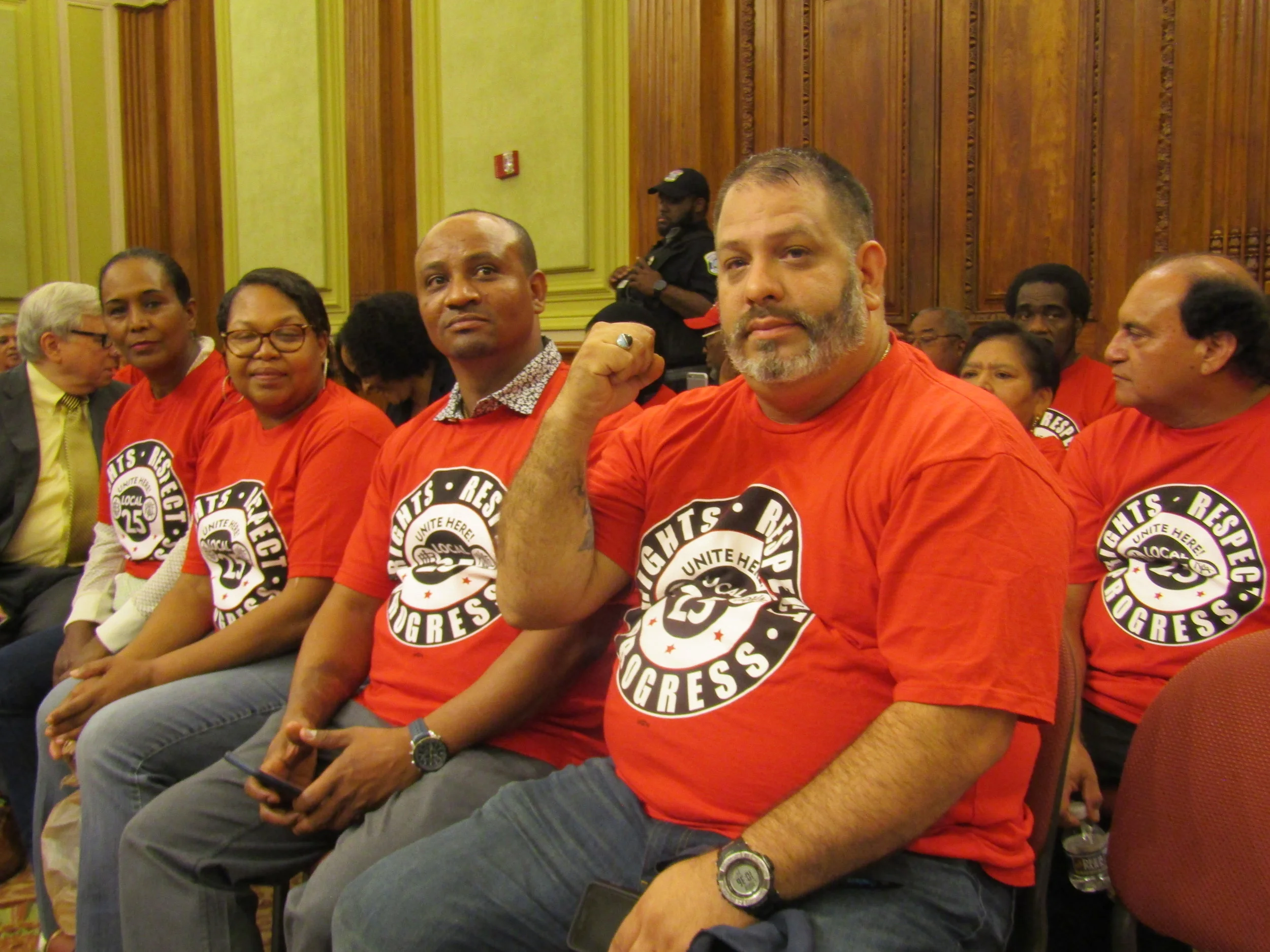A coalition of Virginia groups have formed the raise the wage coalition Virginia in support of House Bill 395. The bill proposes to increase the minimum wage from $7 to $15 by the year 2023. According to deputy political director at Unite Here local 25, Lenace Edwards, “this bill is stronger than previous proposals because it has a faster time frame and avoids regionalism , to help all low-wage workers in the state at the same time.” “Folks have talked about bringing certain districts or areas, phasing them in at a different time, right?” “ That’s unacceptable and would set a dangerous precedent.” Members of Raise the Wage coalition say that workers have not received the same economic boom as businesses, who rank highly in the state.
Fairfax County Times: campaign celebrates food industry
The 1969 slogan, “Virginia is for lovers”, is being re-purposed in efforts to promote the restaurant industry. The Virginia Restaurant, Lodging and Travel Association wants to recognize the role of the restaurant industry in VA, that represents the ninth largest industry in the state. Simultaneously, the restaurant industry continues to add to the economy and local community with providing critical resources such as events, legislation to industry members and workforce development.
The Washington Post: D.C. hearing reveals broad support for legalizing short-term rentals in residential areas
This past Thursday, at the D.C. Zoning Commission hearing, adversaries Airbnb and the District’s hotel industry agreed on relaxing the zoning code in the meanwhile as the short-term rentals law is in the works to become enacted. Currently, of the estimated 9,000 short-term rentals operating in the area, 90 percent of them in residential areas are illegal because of the current zoning regulations that prohibit them.
The Washington Post: Housing advocates push for more aggressive rent-control measures in D.C.
In Sept, D.C. council signed off to extend the 1985 rent control law until Dec. 2030, which allows annual rent increases by landlords. Fearing a higher rate of gentrification in the city, a coalition of 17 groups, unveiled "The Reclaim Rent Control" campaign. This campaign, seeks to expand rent control laws in four ways listed below:
● Cap annual rent increases at the rate of inflation by eliminating the extra 2 percent allowed under the current law.
● Make small, four-unit apartment buildings and all buildings built before 2005 subject to rent control.
● Make new units subject to rent control after 15 years.
● Cut the minimum number of properties landlords must own before they are subject to rent-control provisions and eliminate what are known as “vacancy increases,” which allow landlords to increase the rent of a unit when it is vacated by the previous tenant.
According to a National Community Reinvestment Coalition, out of any other city in the country, D.C. had the greatest "Intensity of Gentrification". To be exact, between 2000 and 2013, 40% of the District's lower-income neighborhoods experienced gentrification. Further research found that over 20,000 African Americans were displaced during that time from their neighborhoods by affluent, White outsiders. Unite Here Local 25 representative, Benjy Cannon, states “Our members live in D.C., and even with the strong wages and benefits we’ve been able to secure for them, staying in the city is still really, really difficult and really, really expensive,” “It’s so important to have a diverse cross-section of groups pushing for this because issues of inequality, racism, housing, poverty, employment — they’re all interconnected.”
WAMU: Transit Advocates Say That A Lack Of Late-Night Options Is Hurting Workers
A nationwide scarcity of late-night transit options is taking a toll on workers and businesses that operate outside of the traditional 9-to-5 schedule. Insufficient public transportation options forces employees to rely on more expensive means to get to and from work. Instead of paying only 3% of their income, a security guard making roughly $14 an hour may have to pay close to half of their income leasing a car and 31% of that income to afford gas.
Labor Day 2019
DC-ist-WAMU: Coalition to rally in support of stronger rent control laws this weekend
At a time when widespread immigration raids are commonly occurring, two major hotel chains with headquarters in D.C. have announced that they will not permit federal immigration enforcement agencies to utilize their hotel rooms as detention centers for immigration families due to a shortage of space in traditional detention centers.
Statement: UNITE HERE Local 25 Slams Threatened Raids and Deportations
The Daily Beast: Is this Embattled D.C. Hotel Sleazier than Trump's?
Last spring, two real estate developers named Matt Wexler and Brian Friedman barreled into a local community meeting in the Adams Morgan neighborhood of Washington, D.C., for a board called the Business Improvement District. The two had just opened a new hotel in the area, and they wanted more cops on the street. Furious that the board had not complied, Wexler read a four-page letter, demanding the leaders’ resignation over what he called “unethical,” “blatantly outlandish,” and “disgusting hypocrisy,” according to a report in Current Newspapers. The performance left the room in shock. “To come in and run roughshod over everyone because of your size—that’s not right,” BID Vice President Arianne Bennett, who runs a local falafel shop, told the outlet at the time. “I got bullied by my own personal Adams Morgan Donald Trump.”
Local 25 Testimony on QHTC Tax Incentives
Good afternoon. My name is Samuel Epps and I am the Political Director of UNITE HERE Local 25, a union representing over 7,500 hospitality workers in the D.C. region.
We support Councilmember Nadaeu’s amendment to scale back the ineffective QHTC incentives. The District’s Chief Financial Officer himself concluded in 2018 that QHTC had a minimal impact on creating jobs and revenue for the District. There’s simply no reason to hand out money to companies that aren’t investing in our residents, or providing meaningful benefits to our workers.
WAMU: MGM Grand National Harbor Workers Worried New Ownership Will Cost Jobs
The MGM Grand National Harbor is one of the top-grossing casinos for its parent company MGM Resorts International. But union employees are concerned that changes to its ownership structure could result in downsizing at the casino.
In a precautionary move, union workers gave public testimony Thursday asking Maryland’s Gaming Commission to increase regulation on hedge funds seeking stakes in casinos. Union workers are worried that MGM’s new relationship with hedge funds Corvex Capital and Lands & Buildings could influence staffing levels at the National Harbor casino.
Statement: Wall Street Investors Threaten Maryland’s Gaming Industry
Amidst growing concerns nationwide about the potentially corrosive influence of Wall Street Firms on casino management, UNITE HERE Local 25 will testify before Maryland’s Gaming Commission Meeting on Thursday, April 25th. Local 25 staff and members will call on the agency to work with stakeholders across the region to address these worrying changes in the industry.
WAMU: An Update On Metrorail’s Late-Night Service
The Federal Transit Administration announced that it might pull $1.6 billion in funding from the Washington region if WMATA decides to extend its Metrorail hours. The FTA cites safety concerns: Extended service hours would cut into overnight Metrorail maintenance.
This puts a wrinkle in the debate about extending Metrorail hours. Proponents of longer hours say that the current schedule disproportionately affects workers in the hospitality industry, who struggle to find reliable, affordable transportation once Metrorail closes. But others are worried that extending the hours would lead to more delays for daytime riders and an economic loss for the WMATA, since Metrorail maintenance would need to shift to daytime hours.
Statement: Ride-sharing won’t fix Metro’s problems with District workers
Washington Post: Metro to subsidize Uber & Lyft fares to fill late-night service gap
UNITE HERE Local 25, a hospitality union representing about 7,500 workers in the D.C. region, seized on the Metro plan as a “PR stunt.”
“Local 25 is deeply skeptical of [Metro’s] reported plan to subsidize ride-sharing instead of reinstating extended service hours,” the union said in a statement. “That [Metro’s] plan essentially proposes to privatize a part of our public transportation infrastructure in the process only adds insult to injury.”
Curbed: D.C. Council gives final approval to Airbnb regulations
D.C. residents who use Airbnb or similar booking services to rent out their homes will likely have to abide by new regulations starting next October, when they are set to go into effect. The policies represent the first time the city has charted comprehensive laws for short-term rental units—an effort that has sparked a fierce debate spanning roughly the past two years.
Jaffe Report: Winners and Losers in the DC Election
“John Boardman and Dyana Forester: The District’s unions went head to head with the developers and the business community in the at-large race — and beat them badly. Boardman’s UniteHere Local 25 of the Hotel Workers union put feet on the ground for Silverman, along with Forester’s United Food and Commercial Workers Local 400. Service employees (SEIU) and the Laborers union backed Silverman as well. In the coming political and policy battles, the unions put themselves in position to push around the business side, thanks to their support of Silverman.”
The Washington City Paper: The Line Hotel in Adams Morgan Draws Scrutiny Over D.C. Job Numbers
The D.C. First Source program was created to provide D.C. residents with job opportunities generated by development. However, the Department of Employee Services failed to effectively implement 80 percent of the law. Its failure is painful to say the least. One in every five D.C. residents lives in endemic poverty, while one in four children suffer from poverty.




